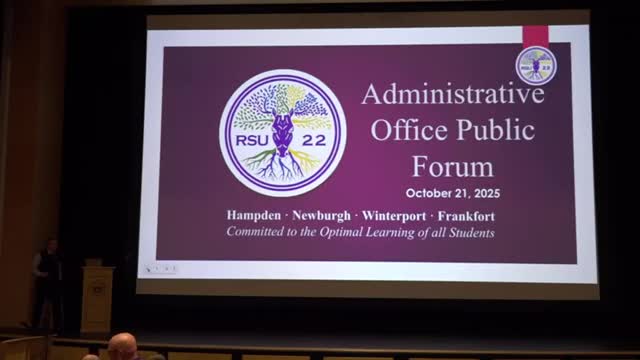RSU 22 previews $977,000 modular administrative building on Nov. 4 ballot; reserve funds already set aside
Get AI-powered insights, summaries, and transcripts
Subscribe
Summary
RSU 22 Superintendent Raymond told about 50 attendees at a public forum that the district will ask voters on Nov. 4 to approve a modular administrative building priced at $977,000, funded from a reserve account the board set aside during the district's recent budget process.
RSU 22 Superintendent Raymond told about 50 attendees at a public forum that the district will ask voters on Nov. 4 to approve a modular administrative building priced at $977,000, funded from a reserve account the board set aside during the district's recent budget process.
The proposal comes after officials described longstanding problems at the district's current central office, built in 1969 at 24 Main Road North, including limited accessibility, cramped storage, leaking ceilings and inconsistent wiring. “It does not,” Superintendent Raymond said of any additional tax impact, “Why doesn't it? Because the money is already set aside.”
The district presented three options it has considered: two prior renovation/expansion plans quoted in 2021 at roughly $1.3 million and $1.5 million, and the current modular proposal from a vendor the presentation named “Modular Genius,” which would place a 53-by-70-foot, roughly 3,700-square-foot building adjacent to the existing office. The modular option would include a full (unfinished) basement for storage, be fully handicap accessible and — if approved by voters — allow the existing building to remain in use until the move day.
Why it matters: officials said the current building cannot reliably accommodate confidential meetings, has only one constrained accessible entrance and contains file storage that will soon be lost when a long-term off-site storage agreement ends in June. The central office supports about 350 employees and the district said it must retain some records permanently. The current on-site file storage room was described in the presentation as roughly 87 square feet.
During the forum, the director of facilities, Bill Booth, and the superintendent answered questions about site impacts, costs and next steps. Officials said the $1.6 million reserve was established in a prior district budget meeting to pay for a new building and that the district is following relevant state statute classifying the project as school construction and therefore subject to referendum requirements. The presenters noted one statutory exception allowing a remodel plus up to 600 square feet of expansion without referendum, but said the board prefers the referendum route.
Community concerns at the meeting included timing of the vote, outreach and transparency; whether the district should instead sell the old building; and protection or relocation of an on-site apple orchard. An arborist's report cited 17 original trees, three of which are dead; presenters said relocating mature trees would be costly and that planting younger trees could give better long-term survival and fruit production. The district said it is applying for a $15,000 Project Canopy grant to support replanting.
Students and staff from the United Technology Center (UTC) described how UTC programs would partner on the build so students gain hands-on experience. “The administrative building that they work in does not represent the school district that it represents well,” said Adam Clore, a business student who interviewed staff for the project. UTC Director Amanda Pierce confirmed students would be bused to the site for work and that multiple UTC programs — carpentry, electrical, landscaping and construction operations — could participate.
Officials highlighted deficiencies they cited in the current building: thin interior walls that hamper confidential conversations; multiple styles and damaged ceiling tiles; single-pane or non-opening windows with constant condensation; bathrooms too small to be accessible (presenters measured one as about 22.75 square feet and another about 25 square feet); and inconsistent outlets for today’s technology needs. The presentation said an upstairs door opening measures 35 inches but, when fully opened, provides a 32-inch clearance in practice.
Cost comparisons shown at the forum put the two 2021 options at about $1.3 million and $1.5 million (requoted in 2025 with an approximately 21% increase), and the modular quote at $977,000. The presenters said the modular price includes sitework, concrete, earthwork and delivery. If voters approve the modular plan, the district said the old building would be demolished and that area converted to parking; officials said demolition and parking are included in the $1.6 million package.
Speakers at the forum urged care for the orchard and for records storage. Jane Jarvey of the local Historical Society asked that any records stored in the new facility be kept elevated off the floor to protect them from water damage. Resident Eric Jardim Hammond and others questioned the timing of the referendum so soon after a close budget vote and called for broader outreach; Superintendent Raymond responded that law requires providing referendum notice at least a week before absentee ballots go out, and that the FY2025 audit remains in process.
No formal vote on the referendum occurred at the forum; the board is seeking voter approval on Nov. 4. If the referendum passes, the district intends to use the reserve funds and proceed with the modular purchase and site work; if it fails, officials said they would reassess options.
Ending: The district said materials shown at the forum — floor plans and statute citations — will be posted on the RSU 22 website, and a notetaker at the meeting will publish answers to any remaining questions raised that evening.
